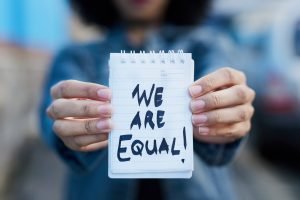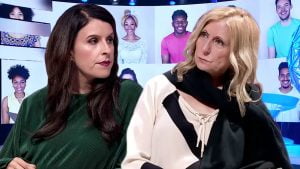Gender and genetics: Ensuring a more equal future for all
by Amjad Atallah
A letter from Doha Debates’ managing director Amjad Atallah
The world today is grossly inequal in its treatment and care for people. And even in 2020, not a single country has achieved full equality among genders in positions of power and pay. At current rates, most of us — including Generation Z — won’t live to see gender equality achieved worldwide. That milestone is still almost 100 years away.
At Doha Debates, we look for common ground that will help us speed up changes to these problems with our digital videos and live shows. This year, we’ve also launched our first-ever podcast — if you haven’t yet listened to “Course Correction” with Nelufar Hedayat, you’ll find it a meaningful and uplifting listen that goes deep on global challenges in very personal ways. Whether you’re trying to recycle more or use less plastic, Nelufar’s immersive approach will inspire you to make practical changes in your own life that have real impact in our world.
Our first two debates of the year, at Northwestern University in Qatar, will take on particularly tricky challenges: gender inequality and the future of genetics. Our moderator, Ghida Fakhry, will be joined on March 9 by three experts to debate how to solve gender inequality, and on March 11, another three experts will join her to debate the future of genetics. Both topics tackle the historical and future structural inequalities in our societies — even those that are about to be literally embedded into our genetic code.
Our first debate is titled Gender Equality: Are Quotas the Answer? As with income inequality or climate change (which we’ll address in a future debate), the question isn’t whether it exists, but rather how to speed up change. Our guest speakers will debate equality of opportunity vs. equality of outcome, and we’ll look for common interests that could fuel practical solutions.
“Is it more meaningful to equalize the starting point — everyone gets the same opportunity to attain what they desire — or to equalize the outcomes, by setting gender quotas for board rooms, classrooms, and other fields where women are underrepresented?”
Amjad Atallah, Managing Director
This promises to be an engaging debate: Randa Abdel-Fattah is an internationally recognized award-winning author, a lawyer, and a human rights and anti-racism advocate. Dr. Christina Hoff Sommers is an author, philosopher, former professor and self-proclaimed “Factual Feminist.” Ayishat Akanbi is a fashion stylist, writer, cultural commentator and artist. Each will stake out their arguments and then, together, they will join Ghida in our Majlis to see if they can find any common ground on how to move forward.
Two days later, we will host our debate on The Future of Genetics: Should We Create Superhumans? Medical and health care is already profoundly inequal — now imagine a world where people can selectively remove genetic diseases from their children and their offspring; and where they can also choose sex, IQ, hair, eye and skin color, or the child’s propensity to make great music or to be an athlete. We are at a decisive moment, where breakthrough technologies such as CRISPR (Clusters of Regularly Interspaced Short Palindromic Repeats, for those good at trivia) give us the potential to use gene editing to create the next iteration of humanity.
Should we embrace human genome editing as a means to help the next generations reach a new level of health, wealth and ability, in effect creating a new class of superhumans? Or should we focus our efforts on improving our societies and their structural inequities? And how do we ensure that everyone has equal access to whichever future we decide upon?
This existentially important topic will be debated by three renowned experts. Dr. Katie Hasson is the Program Director on Genetic Justice at the Center for Genetics and Society, and was previously an assistant professor of Sociology and Gender Studies at the University of Southern California. Jamie Metzl is a technology futurist, author of Hacking Darwin: Genetic Engineering and the Future of Humanity and a senior fellow at the Atlantic Council. Dr. Julian Savulescu is a philosopher and bioethicist and the Uehiro Professor of Practical Ethics at the University of Oxford. Ghida will work with them in our Majlis to try to engineer some common ground.
We invite you to watch our show live on Twitter, Facebook and YouTube at 7 p.m. in Doha, 12 p.m. on the U.S. East Coast, 9 a.m. on the U.S. West Coast., and 4 p.m. in London. As always, we will be listening online to your comments and questions and will try to get them on the show. And be sure to stay tuned in for our post-show conversation, where our correspondent, Nelufar Hedayat, will be joined by Moneera Yassien, a women’s rights advocate from Sudan, to discuss the gender equality debate. After the debate on the Future of Genetics, Nelufar will be joined by Qatar’s very own Nawaal Akram, a comedian, model, athlete and disability rights campaigner.
As always, let me know what you think of the shows, our topics, our guests’ arguments, and of course, what topics you would like to see in future episodes. You can always find me @atallahamjad.
WATCH THE FULL DEBATE:
Gender Equality
WATCH THE FULL DEBATE:
Future of Genetics



